The Pittsburgh Digital Frankenstein Project
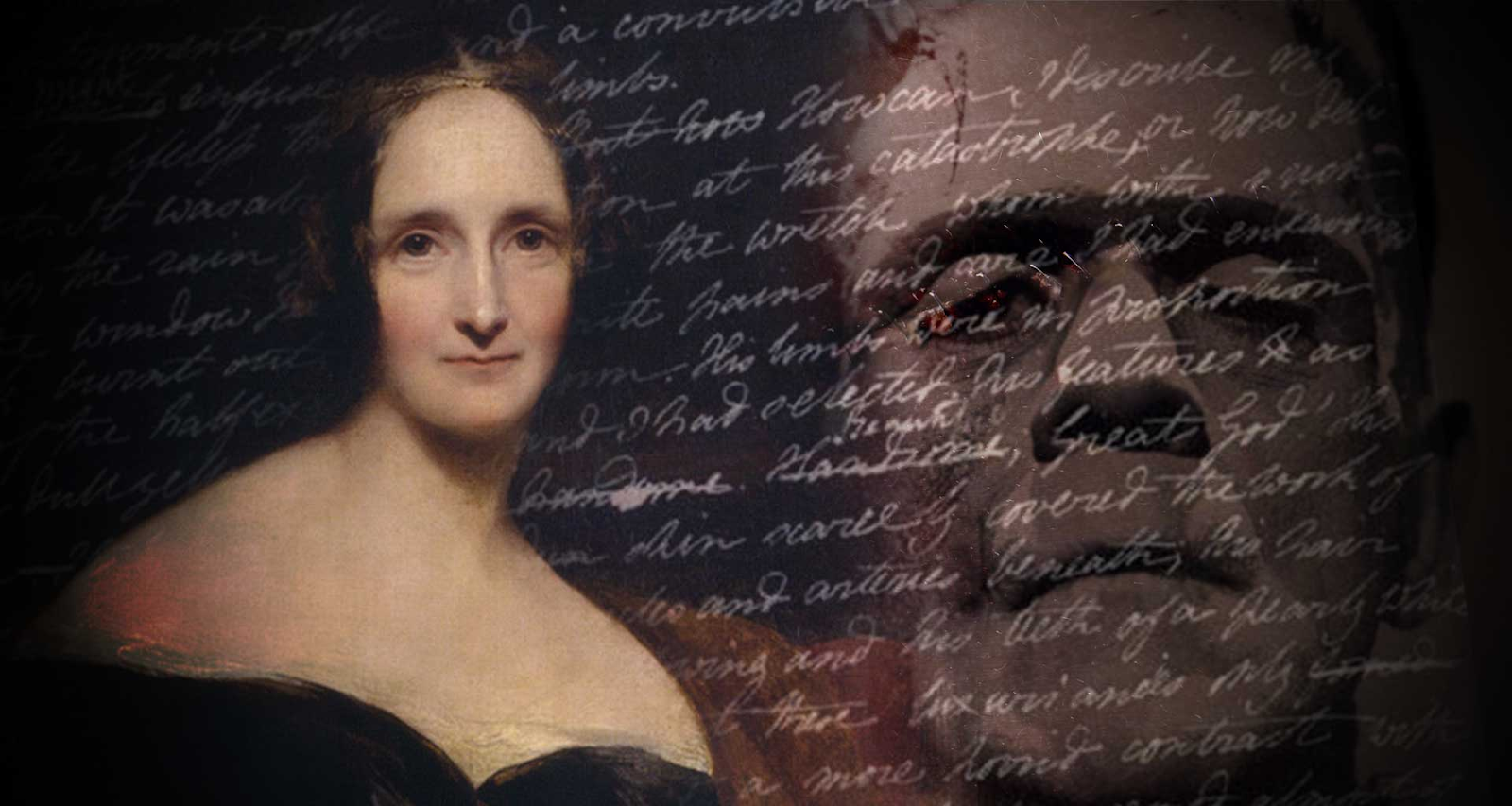

Reassembling Textual Bodies
2 April 2018 U. of Pittsburgh: Humanities Center, 602 Cathedral of Learning
These slides: http://bit.ly/pgh_Frank
Rikk Mulligan | Elisa Beshero-Bondar | Jon Klancher
@CritRikk | @epyllia
Our Team
Edition and Collation
-
Elisa Beshero-Bondar, Director, Center for the Digital Text, and Associate Professor of English, University of Pittsburgh at Greensburg
-
Jon Klancher, Professor of English, Carnegie Mellon University
-
Rikk Mulligan, Digital Scholarship Strategist, University Libraries, Carnegie Mellon University
-
Raff Viglianti, Maryland Institute for Technology in the Humanities (MITH), University of Maryland
Stylometry Concentration
- Matt Lavin, Director, Digital Media Lab, University of Pittsburgh
- Scott Weingart, Program Director of Digital Humanities, University Libraries, Carnegie Mellon University
New Members Pending
-
Mellon Grant Fund Awarded (March 28!) through Carnegie Mellon University
Institutional Intersections
- Sources:
- Maryland Institute for Technology in the Humanities (MITH) at the University of Maryland
- Romantic Circles--the leading website for Romanticism research
- Shelley-Godwin Archive--Frankenstein manuscript notebooks RC
- University of Pennsylvania
- Pierpont Morgan Library, New York City
- Special Collections, Temple University
- Maryland Institute for Technology in the Humanities (MITH) at the University of Maryland
- Collaborators
- Carnegie Mellon University
- Maryland Institute for Technology in the Humanities (MITH) at the University of Maryland
- University of Pittsburgh
- University of Pittsburgh-Greensburg
Our Project's Goal: A Digital "Variorum" Edition
- Visitor chooses to read one of five(+) distinct versions produced between 1816 and 1831
- Each edition is available in full as a READING copy. Visitor selects which one to read as their "base text".
-
Visitor chooses to view how this "base text" edition compares to any of the other four(+) edition(s) available as s/he reads
- Passages highlighted that vary in the other editions the visitor selected for comparison.
- Automatically-generated annotations show how this passage appears in the other editions
- Human-written annotations discuss significance, cultural contexts, allusions, pertinent to all the editions.
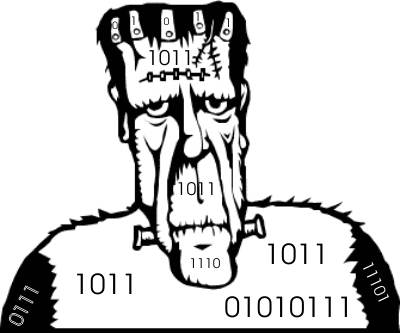
The Creature of Collation?
We reassemble text "bodies" from disparately formed source materials.
source: I programmer article on "Frankenstein" malware
-
1816 Draft MS-Notebooks
-
(2+ boxes at the Bodleian Library)
-
-
1818 Edition
-
(Lackington: 3 volumes)
-
-
"Thomas copy"
-
(hand-written revisions by MWS in a copy of 1818)
-
-
1823 Edition
-
(edited from 1818 ed. by William Godwin)
-
-
1831 Edition (1/2 of a volume)
-
bound with Friedrich von Schiller's The Ghost Seer in Bentley's Standard Series of novels)
-
Textual History in MWS's Lifetime
-
Can we make an edition that conveniently compares the manuscripts to the print publications?
-
Can we make a comprehensive collation to show changes to the novel over time, from 1816 to 1831?
-
How many versions? (5 and a bit?)
-
Which editorial interventions persist from 1816 to 1831?
-
MWS in the "Thomas" copy: how much of this persists into 1831?
-
PBS's additions: which/how many of these persist to 1831?
-
What parts of the novel were most mutable?
-
-
Motivating Questions
James Rieger, ed., first new edition of 1818 in 141
years: inline collation of "Thomas" w/ 1818,
1831 variants in endnotes
Legend:
Stuart Curran and Jack Lynch: PA Electronic Edition (PAEE) , collation of 1818 and 1831: HTML
Nora Crook crit. ed of 1818, variants of "Thomas", 1823, and 1831 in endnotes (P&C MWS collected works)
Romantic Circles TEI conversion of PAEE ; separates the texts of 1818 and 1831; collation via Juxta
1974
~mid-1990s
1996
Charles Robinson, The Frankenstein Notebooks (Garland): print facsimile of 1816 ms drafts
2007
Shelley-Godwin Archive publishes diplomatic edition of 1816 ms drafts
print edition
digital edition
Legend:
2013
2017
Critical and Diplomatic Editions Leading to the Frankenstein Variorum Project
Frankenstein Variorum Project:
assembly/proof-correcting of PAEE files; OCR/proof-correcting 1823; "bridge" TEI edition of S-GA notebook files; automated collation; incorporating "Thomas" copy text
The dream of the 90s. . .
Hypertext / Hypercard books and the PAEE
-
Accessing (reading, writing, editing) texts in nonlinear ways
-
Multiplying and individualizing points of access


PAEE: Hypertext Collation Experiment
hundreds of small html files, juxtaposed in frames
- a community-maintained standard
- 1987 @ Vassar: draft of Poughkeepsie Principles
provide a standard format for data interchange in humanities research.
- Guidelines for the Encoding and Interchange of Machine Readable Texts: first drafted 1990; published on the web by 1999 (P3)
- Standards for encoding texts co-evolve with standards for developing
human and machine-readable markup languages
- HTML (w3c) || (early) SGML and XML
- TEI XML tree structure:
- meant to store a stable format not subject to commercial processing requirements
- possible to publish TEI directly or convert to HTML; PDF; TEX; other document formats.
TEI Experiment 1: Romantic Circles (2007)
- Attempt to express the PA-EE in TEI
- Loses contextual material in the original
- Difficult to integrate old HTML with millenial TEI
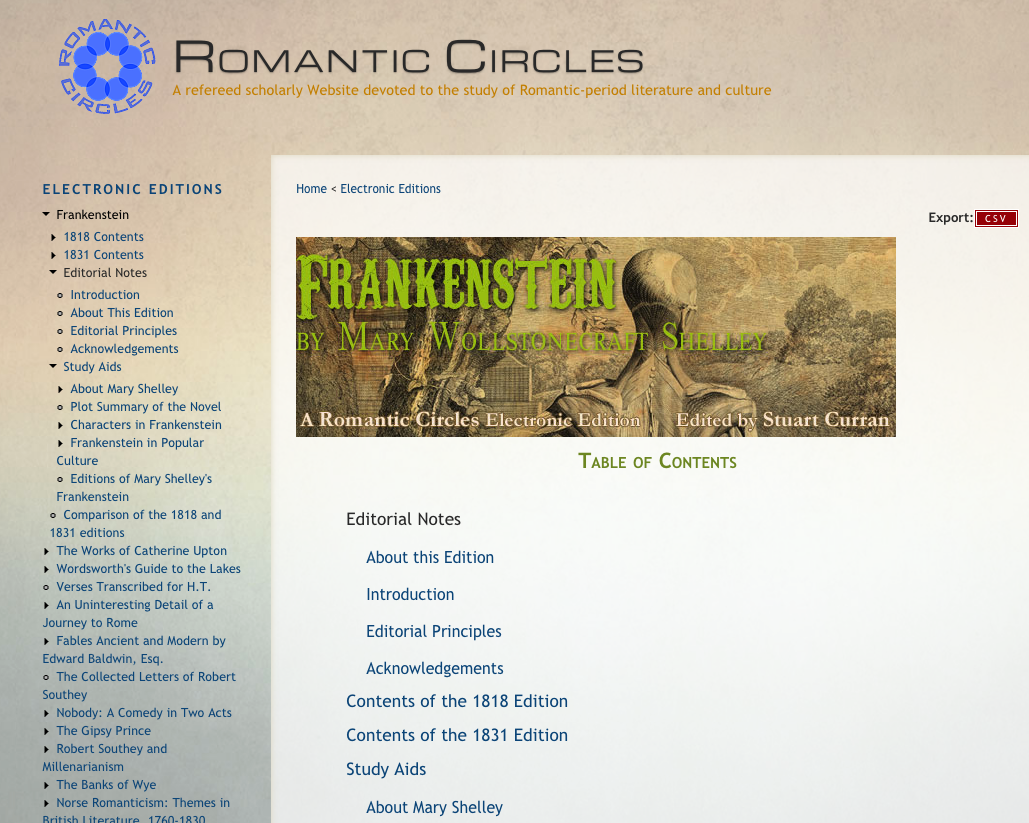
TEI Experiment 2: S-GA

- Make a digital edition of the earliest versions of Frankenstein
- TEI for manuscript notebook pages
- priority on page surfaces, lines, margins, interlinear insertions/deletions
Shelley-Godwin Notebooks: c56 (p.11)
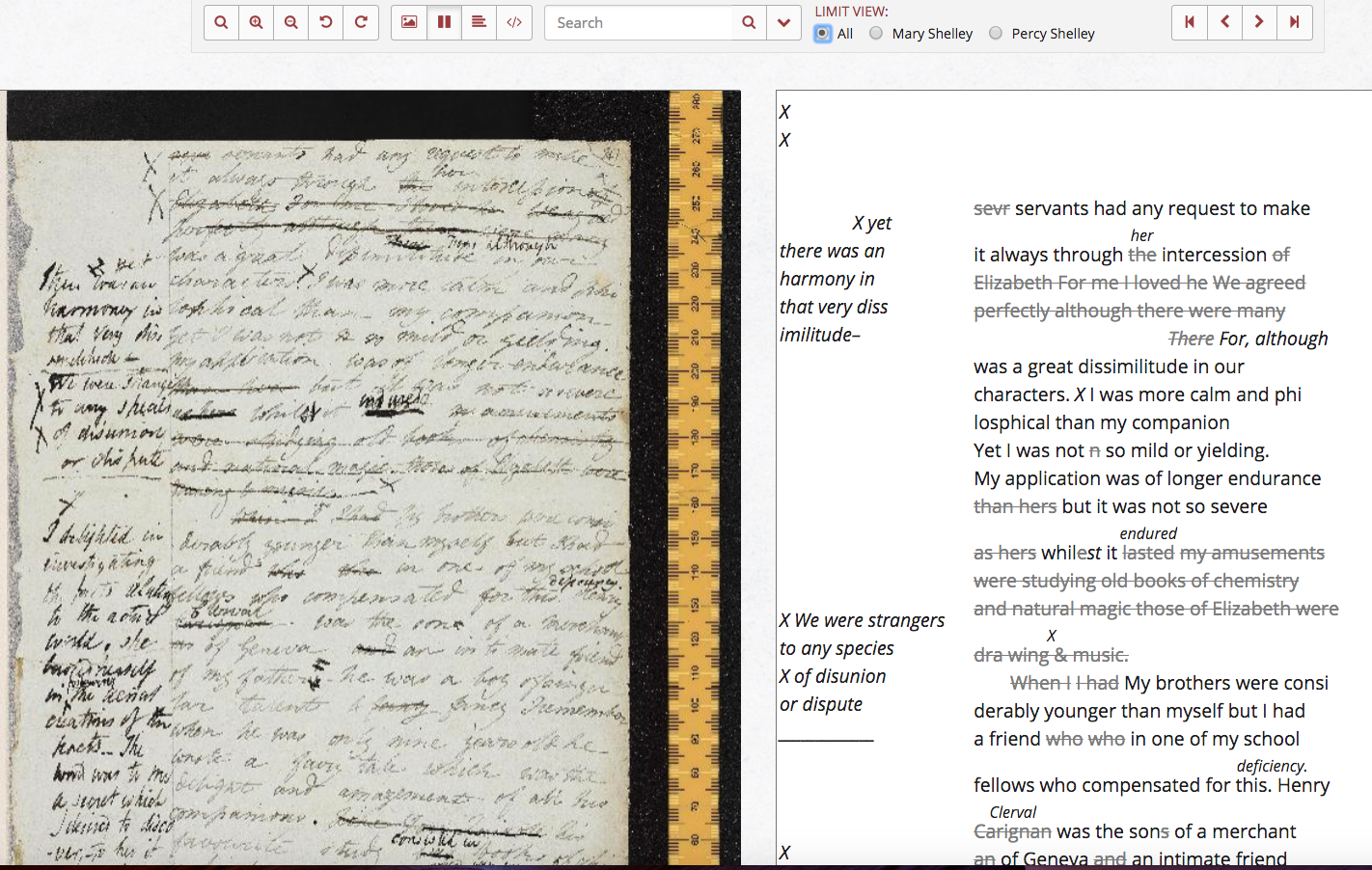
Shelley-Godwin Notebooks
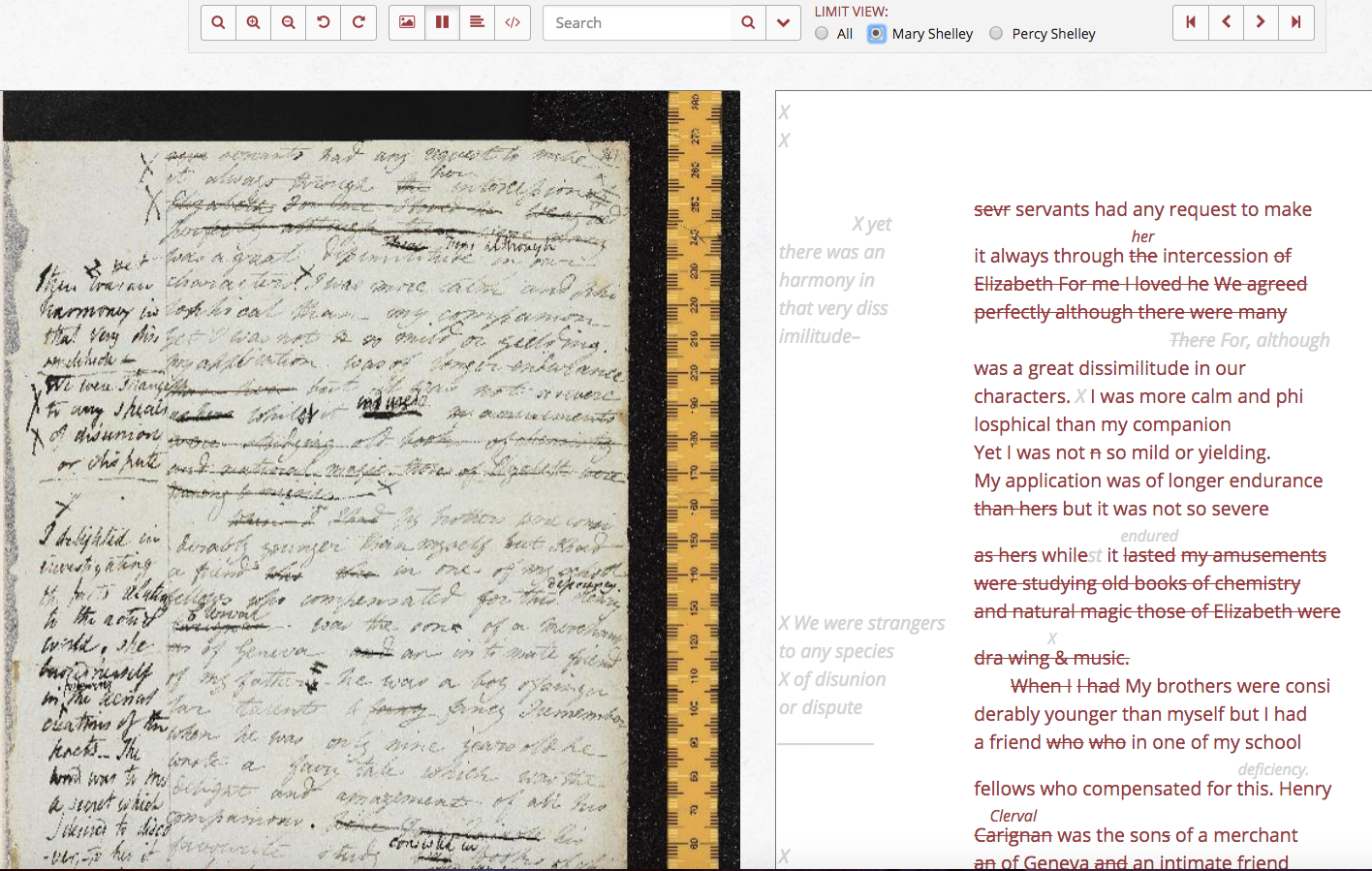
Shelley-Godwin Notebooks
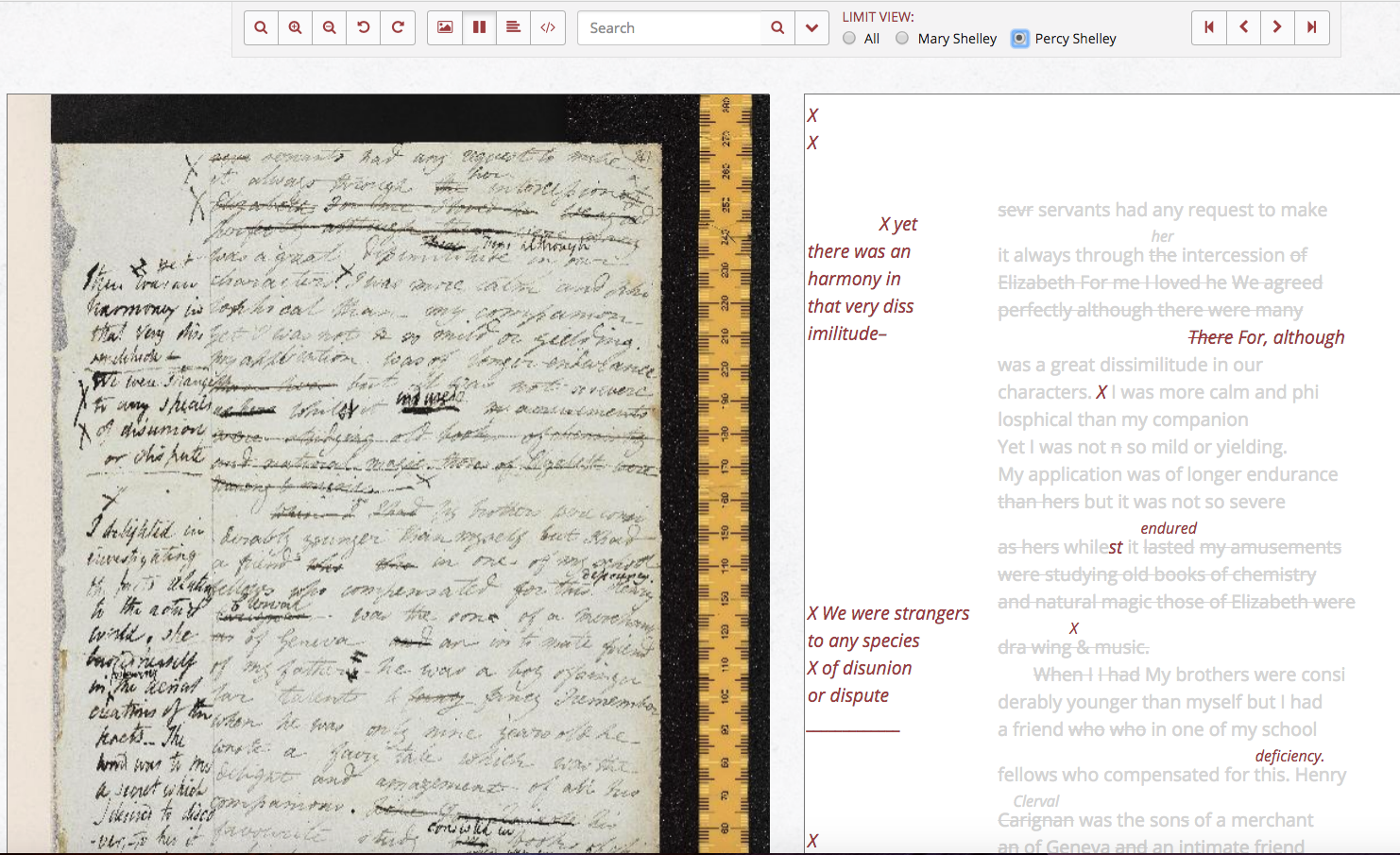
Shelley-Godwin Notebooks
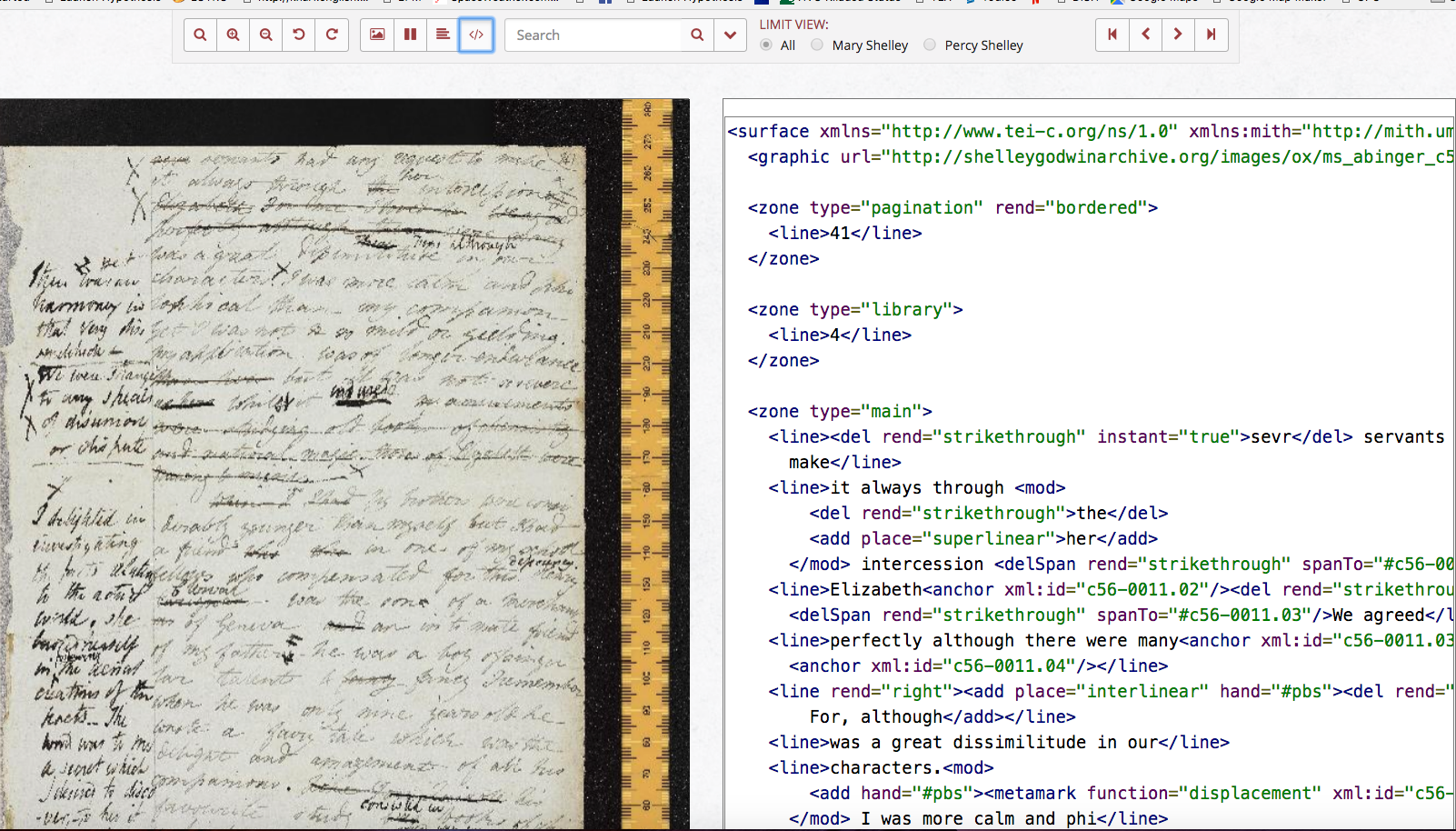
-
Reconcile multiple kinds of text encoding:
-
old '90s HTML (1818, 1831)
-
not-so-plain OCR-generated text (1823)
-
TEI XML for manuscripts: (S-GA diplomatic edition)
-

Pittsburgh's bridges (1963)
Source: NewsCastic.com
Our Edition: A Bridge-Building Challenge
- Construct "Bridge" XML for collation
- Markup-assisted machine collation (collateX):
- "flattened" XML hierarchies for even collation units
- ms metadata markup (e.g. "hands") to ignore in collation, but preserve in the output
- pointers outward to manuscript editions (S-GA, Morgan Library)
"Bridge XML":
Designed for Collation
- construct "light-weight" XML files
- based on semantic structures (letters, chapters, paragraphs, lines of poetry)
- based on semantic structures (letters, chapters, paragraphs, lines of poetry)
- Same encoding present in all editions
- Not TEI yet. (Tag ontology is TEI, but these lack TEI headers and full TEI structure.)
- Smallest tagged unit of text is the paragraph <p> or the <l> (line of poetry).
Text Editing Process: Phase 1 (through last Spring 2017)
- Began with PAEE HTML (1818, 1831)
- Up-convert to "bridge XML"
- ABBYY OCR vs GoogleBook PDF of 1823
- Text Correction of 1823 against PDF
- Initial Collation: 1818, 1823, 1831 (three print editions)
- Text Correction against PDF flagged by Collation output in Tables
Text Editing Process: Phase 2 (begun late summer 2017; ongoing)
- Work out a way to build "bridge XML" from S-GA TEI
- Transform S-GA line elements into sign-post "milestones" and "signal flags" for collation
- Re-sequence marginal annotations for sequential text flow
- Produce fresh collations with S-GA notebooks and Thomas text
- Work out a mechanism for pointing from our "bridge" edition to Shelley-Godwin Archive pages and images
- Byproducts: tabulated text files (CSV) with word tokens for Stylometry team
Text Editing Process: Phase 3
- Up-convert ALL bridge editions to full TEI
- (continuous) proof checking/error correction
- Design and Develop Web interface
- Grant-funded activity beginning 2018
Computer-Assisted Collation:
- Can be done by hand in TEI
-
Automated: via CollateX
-
Algorithms for locating union and "delta" points in "streams" of text
-
Inputs in a variety of formats (XML/TEI, plain text, JSON)
-
-
Output / Visualization options:
-
Text table (above); SVG flow chart; XML
-
JuxtaCommons on the web
-
Develop a custom web interface (via XML output)
-

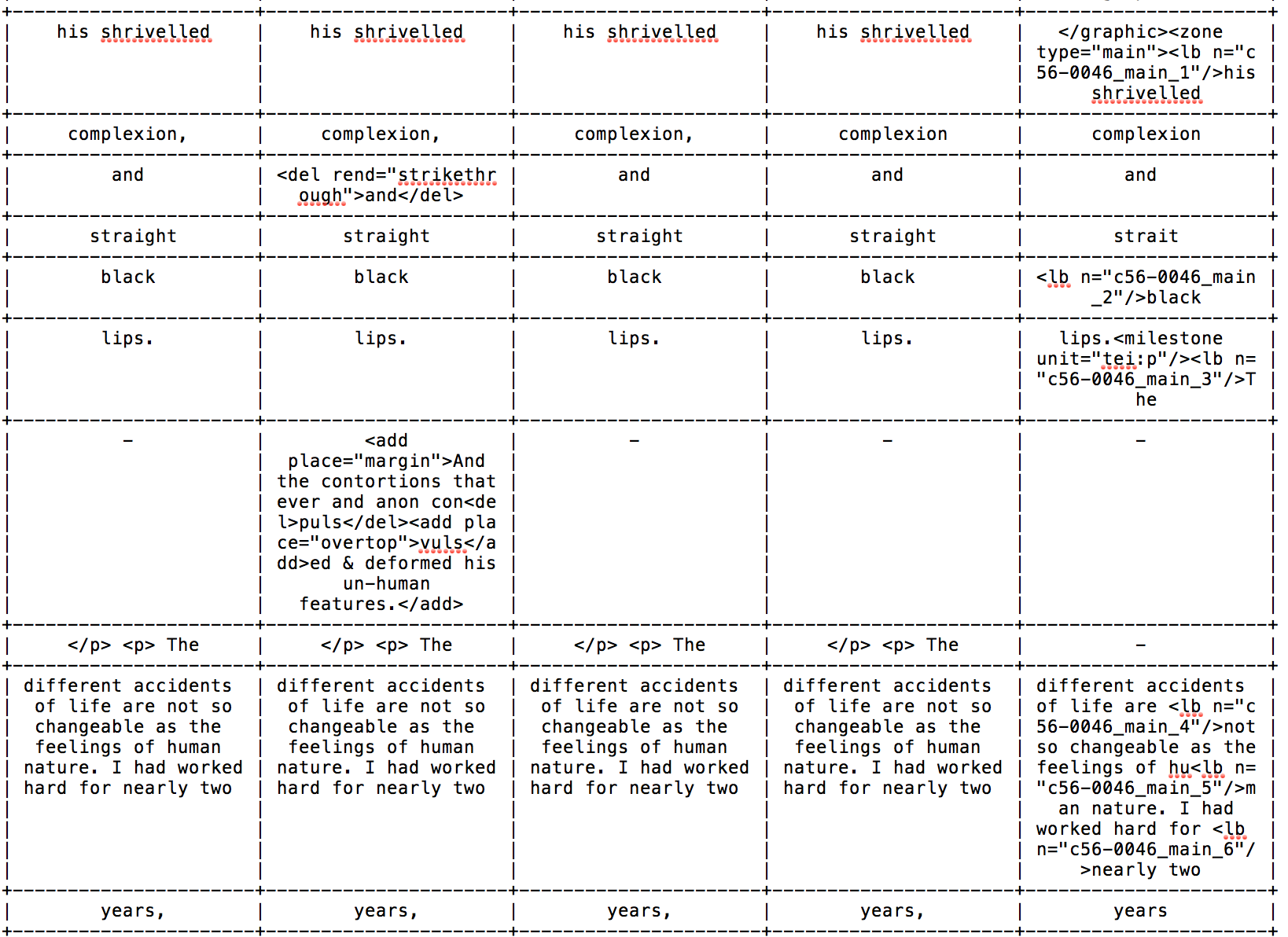


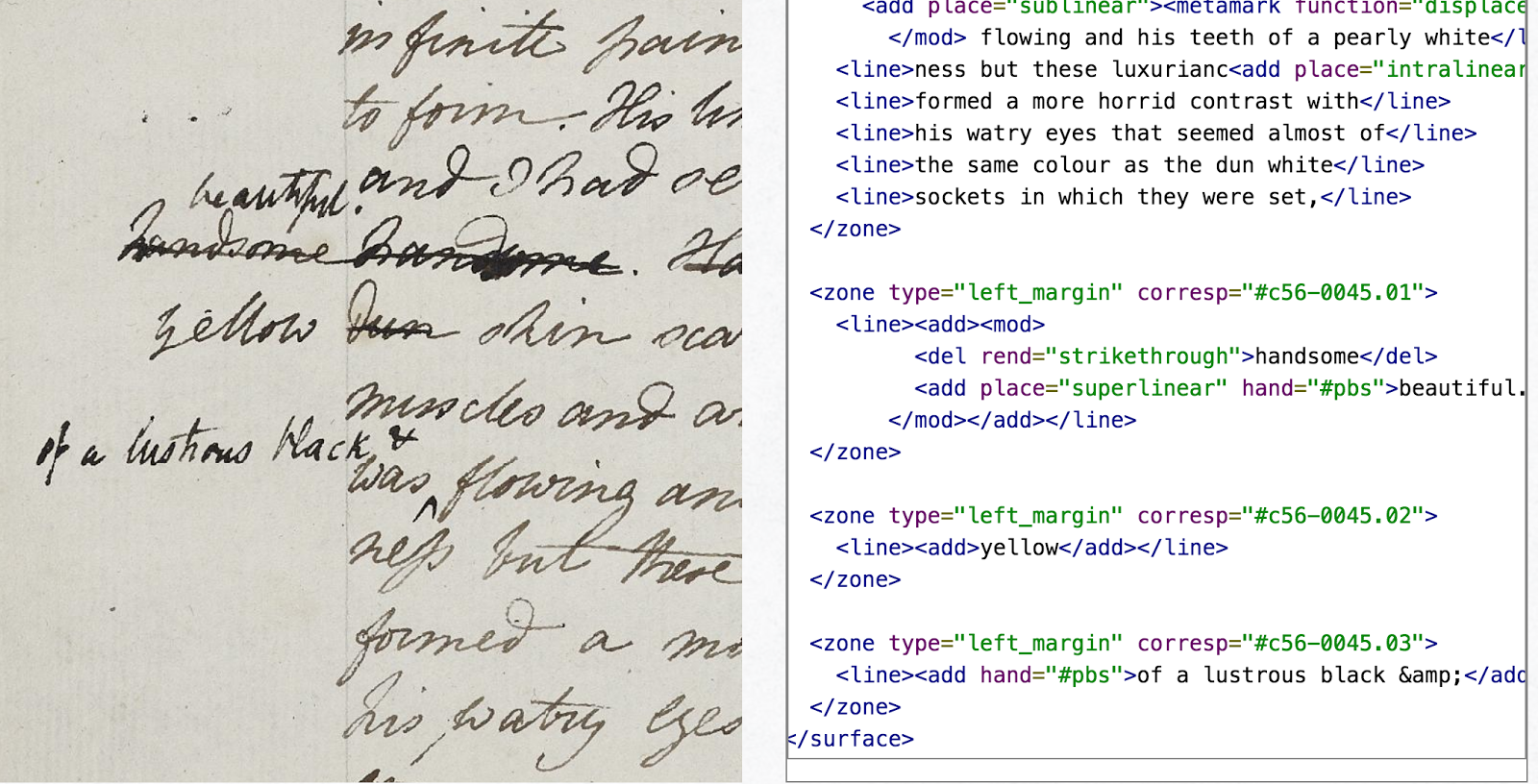
image source: S-GA
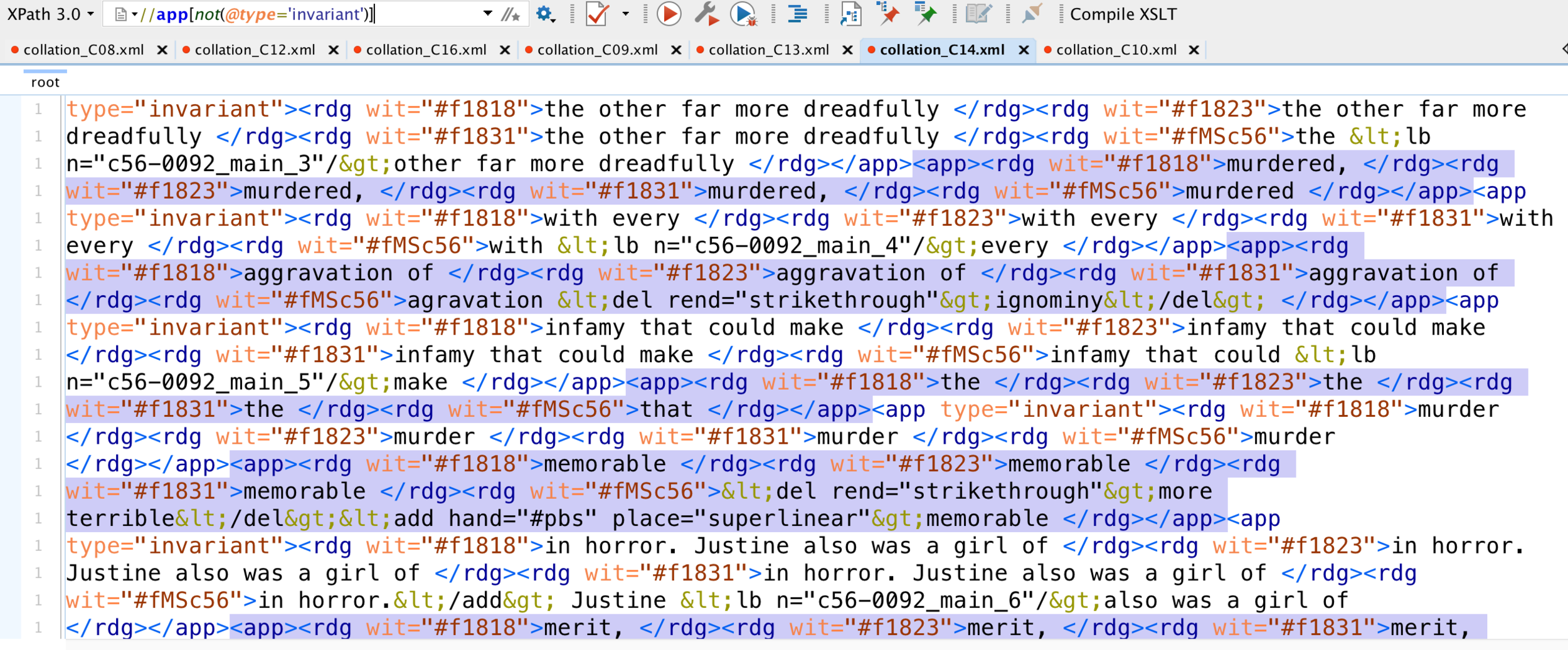
XML collation: flagging variants and Percy's hand
Collation of April 2018
- Collation now includes:
- complete 1816 S-GA manuscript notebooks
- the Thomas edition (MWS's hand-corrections on the 1818 text)
- published editions (1818, 1823, 1831)
- Collation segments of interest:
- GitHub directory: Text tables for 33 aligned collation units
- C30: Victor's final moments with Elizabeth (divergence of "Thomas" and MS Notebooks from published editions)
Variorum Interface: Under Development
- Build TEI "backbone" file from unified XML collation output
-
Experiment: construct a "stand-off" file that contains pointers to source files and images
-
Experiment: construct a "stand-off" file that contains pointers to source files and images
- Transform one XML collation file to multiple HTML files
- one HTML for each edition
- challenge: deal with flattened element tags pulled in to the XML collation from source files
-
highlight variant passages and share variants (CSS and JavaScript)
- one HTML for each edition
- Prototype Web Interface: (Digital Mitford Project)
Jon Klancher
Annotations
- Digital edition: aims to multiply the textual versions and individualize the points of access to the novel--"reassembling textual bodies" in nonlinear ways. Like other digital editions it thus embodies a poststructural conception of the text as fluid, unstable, open to the reader's remaking.
-
Print editions: since the 1980s, scholars and editors have made 1818 the most authoritative, culturally rich, and widely taught print edition (today. Given the scholarly and pedagogical weight of that assessment by historicist criticism, our annotation of the text starts with 1818 and its historical situation.
- By reopening 1831 and three other versions to equal access, this variorum hopes to establish a transhistorical edition (not an "ahistorical" one) that combines textual mobility and multiple cultural contexts. By means of annotation we register 1818's cultural/intellectual contexts as the print "annotated editions" do now. But we can also tunnel through to variations in the other 4 editions, revealing textual changes over time, and the cultural/intellectual contexts particular to those. This approach partly answers the long-standing complaint that historicist contextualizing "imprisons" a text's meaning in its first context of publication. Our edition reanimates textual mutations and multiple contexts over time.
Annotated Print Editions of Frankenstein
1993 Leonard Wolf, ed., The Essential Frankenstein: The Definitive, Annotated Edition of Mary Shelley’s Classic Novel (New York: Plume). (1st edition as The Annotated Frankenstein, 1977, using 1831 ed.)
2012 Susan J. Wolfson and Ronald L. Levao, The Annotated Frankenstein (Cambridge, MA: Belknap Press of Harvard University).
2017 Leslie S. Klinger, ed., The New Annotated Frankenstein (New York: Liveright/Norton).
2017 David G. Guston, ed., Frankenstein: Annotated for Scientists, Engineers, and Creators of All Kinds (Cambridge, MA: MIT Press).
Susan J. Wolfson and Ronald L. Levao, The Annotated Frankenstein (Cambridge, MA: Belknap Press, 2012)
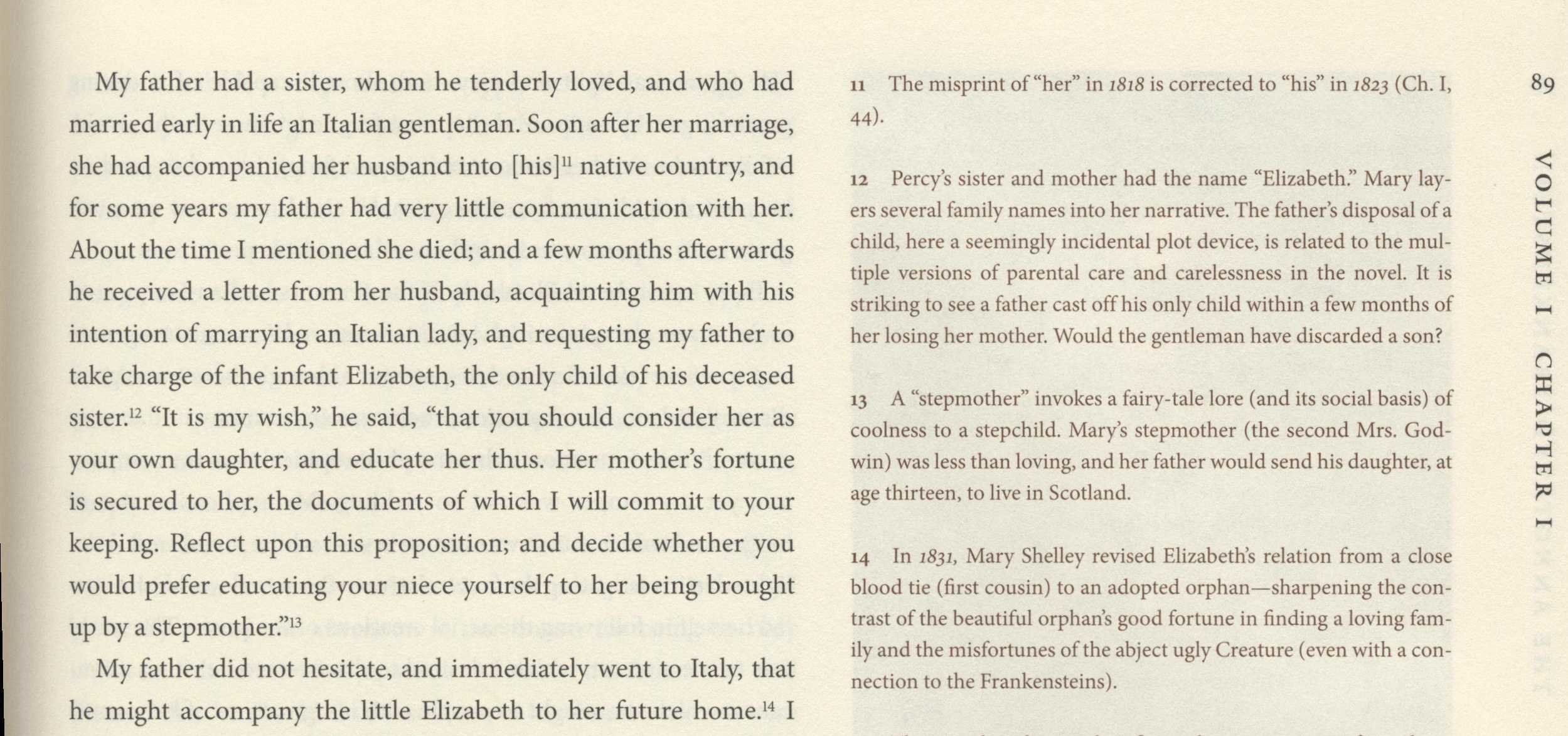
2017 Leslie S. Klinger, ed., The New Annotated Frankenstein (New York: Liveright/Norton).
This annotation is the verbatim 1831 altered text.
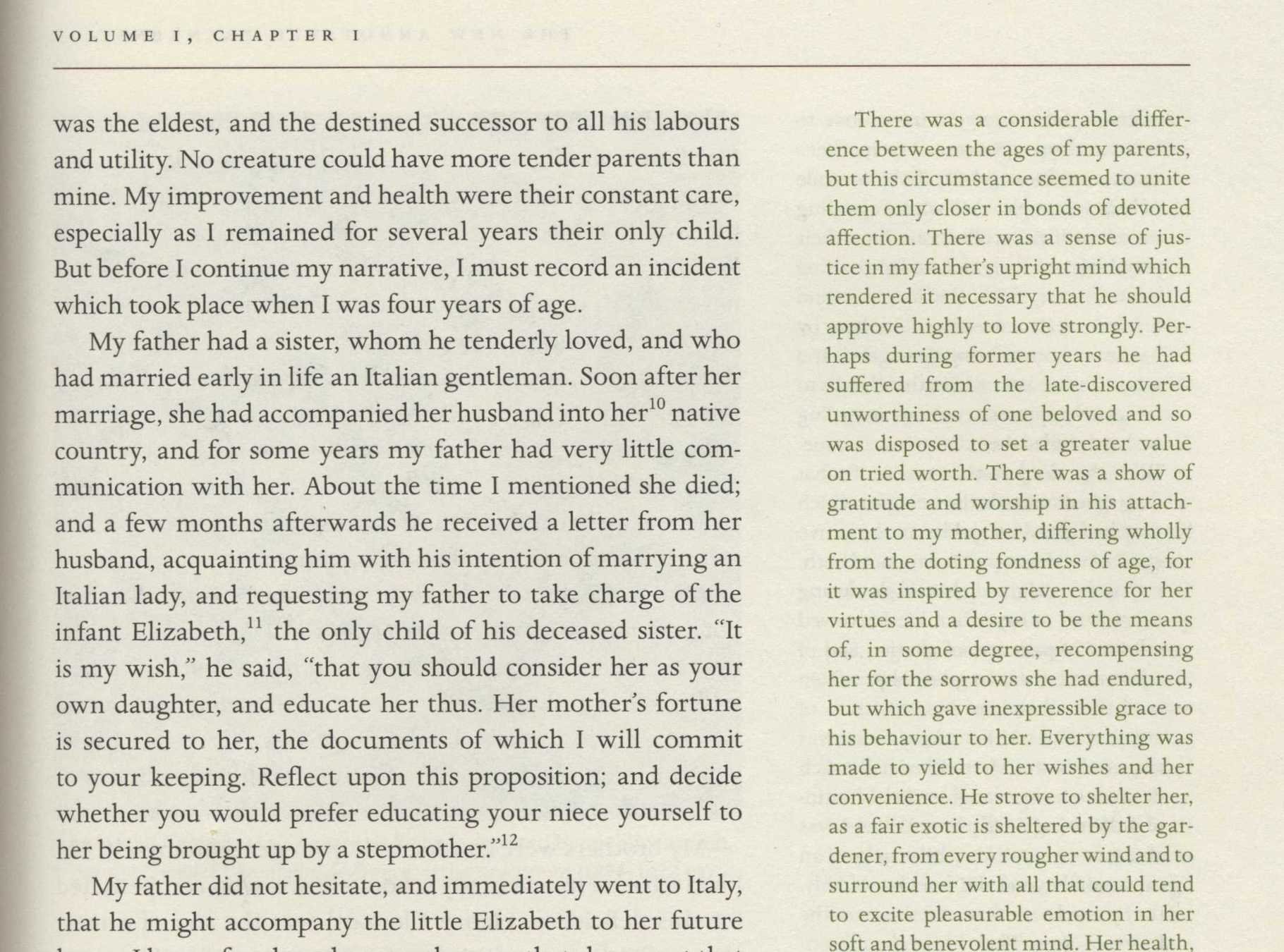
Wolfson annotation:
Published in 1791, in the wake of the French Revolution (Volney was part of the Revolutionary government), Les Ruines; ou Meditation sur les revolutions des empires appeared in English as Ruins, or Meditations on the Revolutions of Empires, in 1792.
Klinger annotation:
More properly, The Ruins, Or, Meditation on the Revolutions of Empires; and the Laws of Nature, by Constantin-François Chasseboeuf, who took the name Volney, published in 1791 in French. It was translated in 1802 into English. The book is described by Frankenstein scholar Pamela Clemit as a “powerful Enlightenment critique of ancient and modern governments as tyrannical and supported by religious fraud” (“Frankenstein, Matilda, and the Legacies of Godwin and Wollstonecraft,” in The Cambridge Companion to Mary Shelley, ed. Esther Schor [Cambridge: Cambridge University Press, 2003] 35.)
In light of the date of translation, the book in question must have been the French edition, and Safie and the creature learned French….
Digital Frankenstein Variorum annotation:
Of the books the Creature hears read aloud in the forest, Volney's The Ruins; or, A Survey of the Revolutions of Empires (1792) was the most closely associated with Europe's radical Enlightenment. (It was first published in French as Les Ruines: ou Meditation sur les revolutions des empires in 1791.) The Creature learns an illuminating critique of imperialism and exploitation from Volney, even as he also absorbs some of the Enlightenment's own prejudices ("slothful Asiatics"). The effect on the Creature is to give him a sense of the social or structural and not only a personal framework for understanding virtue and suffering. On Volney’s role in the novel, see also Ian Balfour, "Allegories of Origins: Frankenstein after the Enlightenment," SEL: Studies in English Literature 1500-1900 56.4 (2016): 777-98.
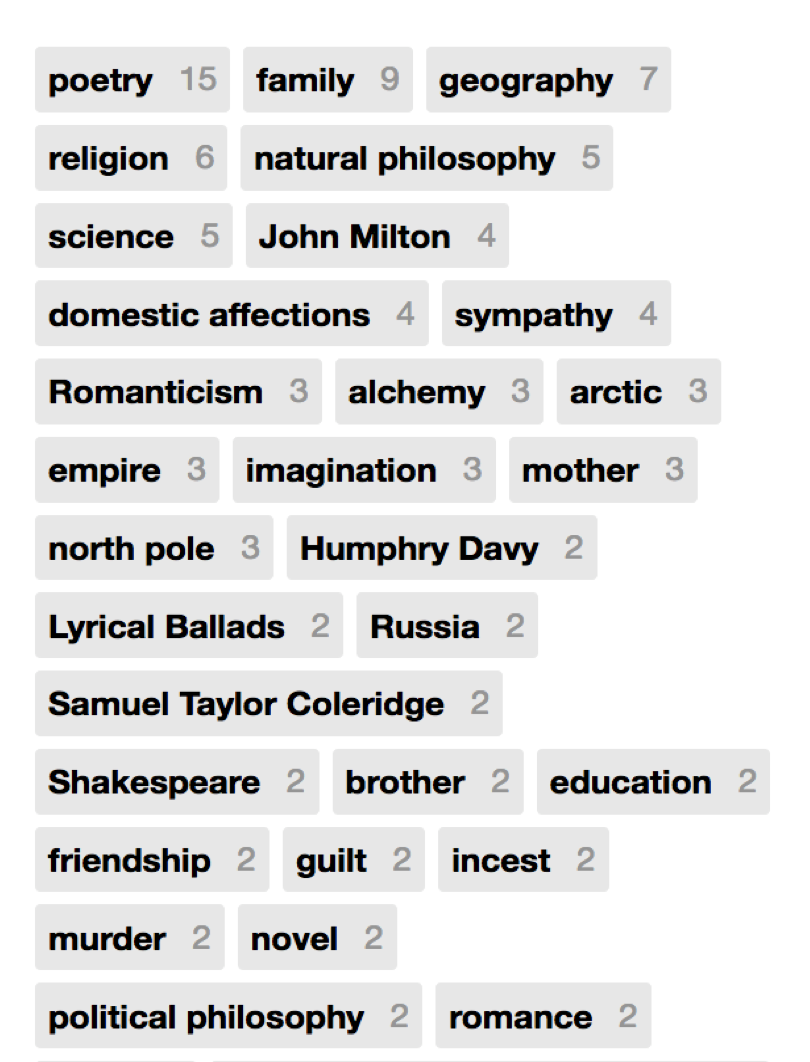
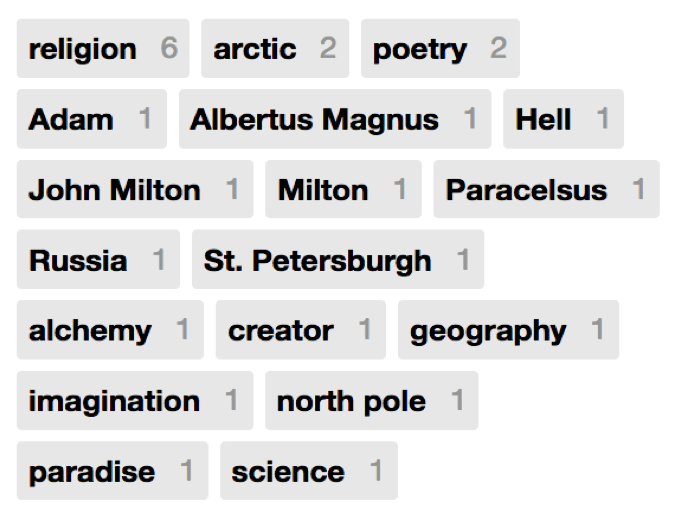

using the hypothes.is tool for digital annotation with tags
hypothes.is: all tags so far...

Annotations that Tunnel through the Texts
(not only pointing to external context)
domestic affection
(Walton - Margaret Seville)
domestic affection
(DeLaceys and Safie)
domestic affection
(Frankenstein family)
travel/expedition: Walton
travel/expedition: Victor
travel/expedition: Clerval
travel/expedition: Creature
law / judicial system
(Justine)
law / judicial system
Felix DeLacey
law / judicial system
Victor/Kirwin
How to annotate between editions?
1816 / 1818/ Thomas 1818/ 1823 ed. Godwin/ 1831
1818 / 1831:
<p>I took the hand of Elizabeth: “You are sorrowful, my love. Ah! if you knew what I have suffered, and what I may yet endure, you would endeavour to let me taste the quiet, and freedom from despair, that this one day at least permits me to enjoy.”</p>
Thomas :
<p><add>Then gazing on the beloved face of Elizabeth on her graceful form and languid eyes, instead of feeling the exultation of a—lover—a husband—a sudden gush of tears blinded my sight, & as I turned away to hide the involuntary emotion fast drops fell in the wave below. Reason again awoke, and shaking off all unmanly—or more properly all natural thoughts of mischance, I smiled as</add> I took the hand of Elizabeth: “You are sorrowful, my love. Ah! if you knew what I have suffered, and what I may yet endure, you would endeavour to let me taste the quiet, and freedom from despair, that this one day at least permits me to enjoy.”</p>
"Mutant" Addition in Thomas Text
(sometime between 1818 and 1823)
Book 3, Ch. 5: passage just before Elizabeth is murdered by the Creature
1818 / 1831: <p>[...] I never ventured abroad during daylight, fearful of meeting with the same treatment I had formerly endured in the first village which I entered.</p>
Thomas : <p>[...] I never ventured abroad during daylight, fearful of meeting with the same treatment as I had formerly endured in the first village which I entered. <add>Nay if by moonlight I saw a human form, with a beating heart I squatted down amid the bushes fearful of discovery. And think you that it was with no bitterness of heart that I did this? It was in intercourse with man alone that I could hope for any pleasurable sensations and I was obliged to avoid it—Oh truly, I am grateful to thee my Creator for the gift of life, which was but pain, and to thy tender mercy which deserted me on life’s threshold—to suffer—all that man can inflict</add></p>
"Mutant" Addition in Thomas Text
(sometime between 1818 and 1823)
Book 2, Ch. 5: the Creature is hiding while observing the DeLaceys,
just before he hears them reading Volney's Ruins of Empire aloud.
Frankenstein's invitation/challenge:
<TEI xmlns="http://www.tei-c.org/ns/1.0">
<teiHeader>
<fileDesc>
<!--METADATA -->
</fileDesc>
</teiHeader>
<text>
<body>
<!--DOCUMENT-->
</body>
</text>
</TEI>
- Build Digitally:
- Experiment with human and machine reading
- Build a Strong, Sustainable Bridge:
- update Romantic Circles edition
- interlinks to Shelley-Godwin Archive Notebooks: point to ms pages
- Morgan Library "Thomas copy"
-
Centralize the Critical Apparatus
- a tool for scholars
- a metanarrative?
- a remixing of the reading process for all who care about Frankenstein
- make all the texts available to all the readers
The work continues...
- Collation
- Annotation
- Stylometry
- Visualization and Variorum Interface